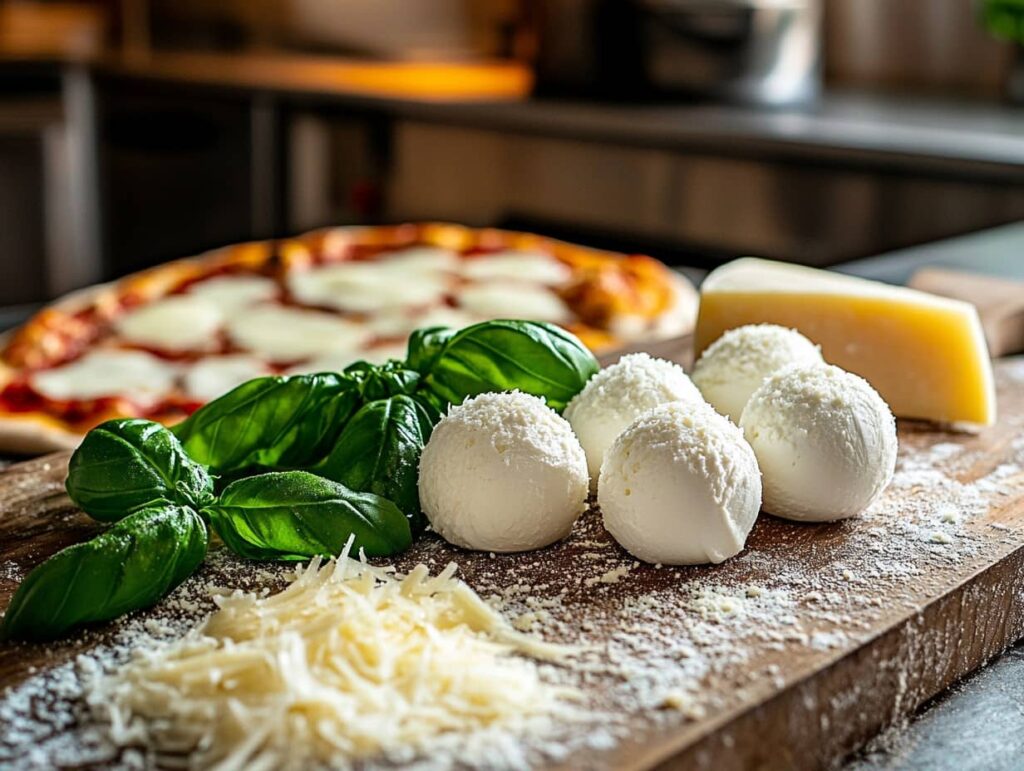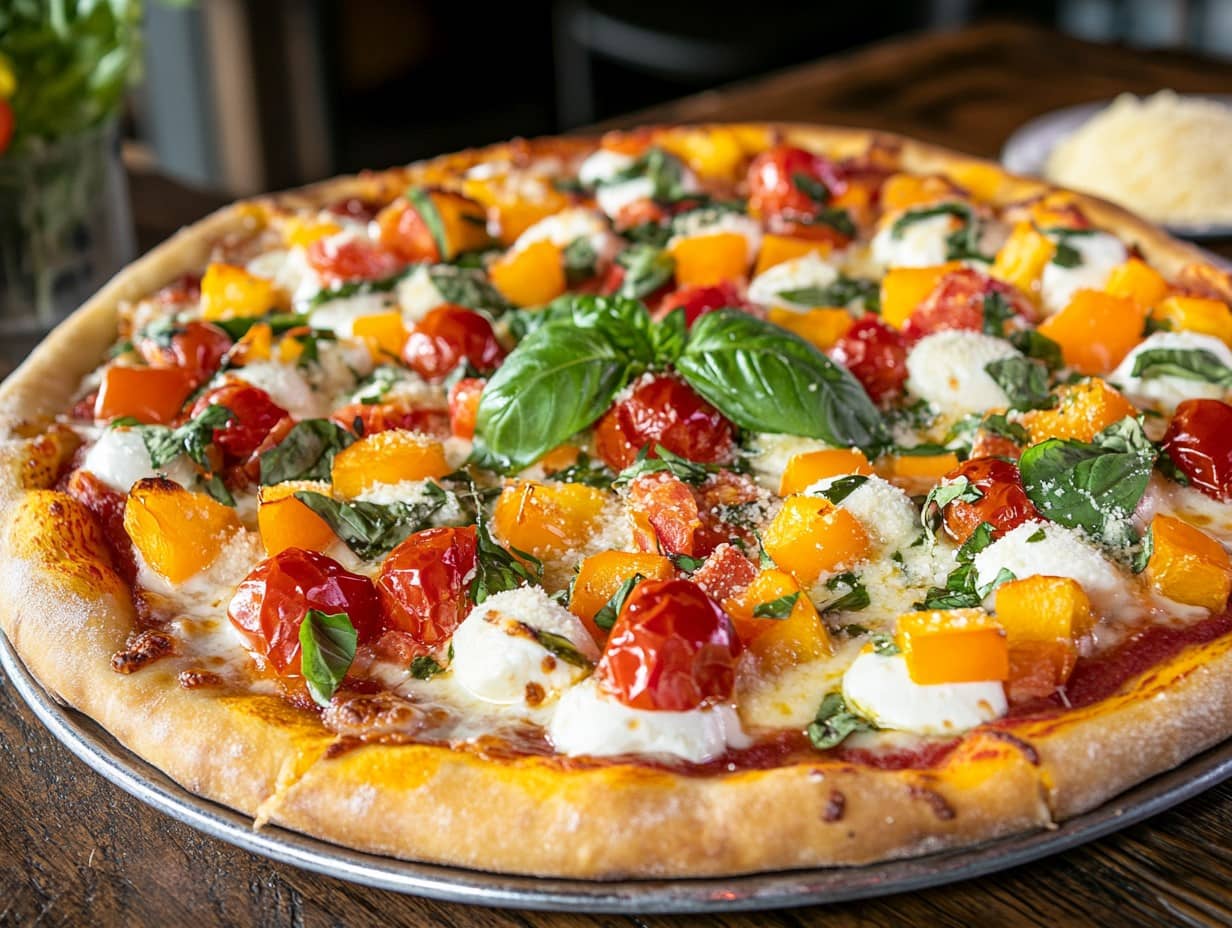What Makes Pizza More Tasty? Imagine sinking your teeth into a warm slice of pizza the kind with a crisp, golden crust that crackles as you bite, tangy tomato sauce that bursts with flavor, gooey cheese stretching with every pull, and toppings so fresh they make your taste buds dance. It’s already delicious, but have you ever wondered what makes an amazing pizza? Whether you’re a home cook or a pizza enthusiast, the secrets to crafting the ultimate, flavor-packed pizza are within your reach.
Table of Contents
The Art of Crafting a Delicious Pizza
Crafting a truly tasty pizza starts with understanding the essentials. From perfecting the dough to selecting the best toppings, everything plays a role in achieving that perfect bite. For more tips, check out tasty pizza secrets: mouth-watering techniques.
Choosing the Right Dough
The dough is the backbone of your pizza, and giving it the love and attention it deserves can make all the difference.
- Flour Matters: The type of flour you choose impacts the texture and flavor. Bread flour delivers a delightful chewiness, while all-purpose flour is a great option for beginners.
- Fermentation Time: Did you know the secret to flavorful dough lies in patience? Allowing your dough to ferment for 24 to 48 hours lets natural yeast activity develop, creating depth of flavor.
- Hydration Levels: While sticky, a wetter dough often yields that airy, light crust everyone raves about.
“A good dough is like the soul of a pizza it holds everything together.”
Secrets to a Flavorful Sauce
Ah, the sauce pizza’s unsung hero and the foundation of its flavor. A great sauce can elevate your pizza to a whole new level. Understanding what makes pizza more tasty starts with nailing this key component.
- Fresh Tomatoes Are Key: There’s no substitute for the natural sweetness and tang of ripe, fresh tomatoes. San Marzano tomatoes are the gold standard, with their velvety texture and balanced flavor making every bite a dream.
- Seasoning Counts: Think of your sauce as a canvas, and herbs and spices as the colors that bring it to life. Dried oregano, fresh basil, and a touch of salt are essentials. Don’t be afraid to add a pinch of sugar to balance acidity it’s like music to your mouth.
- No Cook vs. Cooked Sauce: Each method brings its own magic. A no-cook sauce keeps flavors fresh and vibrant, perfect for light, summery pizzas. Slow-cooked sauces, on the other hand, offer deep, rich flavors that wrap your palate in warmth.
For further inspiration, explore what is the most tasty pizza to learn about sauce pairings that complement popular pizza styles.
Perfect Cheese Combinations
Cheese is the heart of a pizza’s indulgent charm the creamy, stretchy goodness that makes every bite unforgettable. But do you know what makes pizza more tasty when it comes to cheese? It’s all about blending flavors, textures, and meltability.

- Mozzarella: The MVP of pizza cheeses, mozzarella is a universal favorite for its gooey stretch and mild, creamy flavor. It creates that classic cheese pull we all crave.
- Parmesan: A sprinkle of Parmesan adds a nutty, salty punch that complements the richness of mozzarella. It’s perfect for a touch of gourmet flair.
- Provolone: Creamy with a subtle sharpness, provolone adds depth and complexity, beautifully pairing with both mild and bold toppings.
“Cheese is like the harmony in a song; each type adds its own note to the melody.”
Blending these cheeses creates a balance that will leave your taste buds dancing with joy. 🧀
The Role of Ingredients in Enhancing Taste
Ingredients are your palette, and the fresher they are, the better your “pizza painting” will look and taste!
Using Fresh and Quality Ingredients
Quality over quantity, folks. Fresh ingredients burst with flavor, while stale ones? Meh.
- Vegetables: Crisp and colorful veggies add crunch and sweetness.
- Meats: Choose high-quality cured meats like pepperoni or prosciutto.
- Herbs: Fresh basil leaves can elevate your pizza from good to gourmet.
The Importance of Seasoning
Even the best dough and sauce can fall flat without proper seasoning.
- A sprinkle of salt in the dough enhances its flavor.
- Season your sauce generously but tastefully.
- Finish your pizza with a dash of flaky sea salt or chili flakes.
Adding Unique Toppings
Why settle for ordinary when you can go extraordinary?
- Unexpected Combos: Pineapple with jalapeño for sweet and spicy goodness.
- Gourmet Choices: Think figs, arugula, or truffle oil.
- Texture Variety: Add crunch with nuts or seeds.
“Toppings are like accessories they can either make or break your outfit, or in this case, your pizza!”
Baking Techniques That Enhance Flavor
Cooking your pizza correctly is the ultimate game-changer. You wouldn’t roast marshmallows on a low flame, right? The same goes for pizza!
Understanding Heat Distribution
Even heat ensures every bite is cooked to perfection.
- A hot oven is non-negotiable. Aim for 500°F or higher.
- Use a pizza stone or steel to mimic the effect of a professional pizza oven.
Benefits of Stone Ovens vs. Conventional Ovens
Stone ovens? The crème de la crème for pizza baking.
| Feature | Stone Oven | Conventional Oven |
|---|---|---|
| Heat Retention | Exceptional | Moderate |
| Crust Quality | Crisp and airy | Often less crispy |
| Baking Time | 90 seconds to 2 minutes | 10 to 15 minutes |
But don’t fret; you can still create magic in a conventional oven!
Timing and Temperature Tips
Time and temp are the twin pillars of baking success.
- Preheat your oven for at least 30 minutes.
- Rotate your pizza halfway through for even cooking.
- Watch for visual cues: bubbling cheese and golden crust mean it’s ready!
Nutrition Facts of a Basic Margherita Pizza
Here’s a quick look at the nutritional breakdown of a standard slice (approx. 150g):
| Nutrient | Amount |
|---|---|
| Calories | 250-300 |
| Protein | 10-12g |
| Carbohydrates | 35-40g |
| Fats | 10-15g |
| Fiber | 2-3g |
Want to make it healthier? Add veggies or use whole-grain dough! 🌱
Tips for Balancing Flavors
A great pizza isn’t just about throwing ingredients together; it’s about finding harmony. Each bite should feel like a flavor symphony.
Achieving the Perfect Crust-to-Topping Ratio
Ever had a pizza slice where the toppings slid off, or the crust overpowered everything else? That’s a sign of imbalance.
- Keep It Proportional: Avoid overloading your crust with heavy toppings.
- Spread Evenly: Distribute sauce, cheese, and toppings uniformly.
- Crust Thickness Matters: Thin crusts call for lighter toppings, while thicker ones can handle a bit more weight.
“The crust is the canvas, and the toppings are the artwork don’t overcrowd your masterpiece!”
Balancing Sweet, Savory, and Umami Notes
Taste buds love variety. To make pizza irresistible, balance these key flavors:
- Sweetness: Add caramelized onions or a drizzle of honey.
- Savory: Incorporate meats, olives, or anchovies.
- Umami: Boost depth with mushrooms, aged cheeses, or tomatoes.
A pinch of salt or a squeeze of lemon can also elevate the overall flavor profile.
Exploring Regional Variations
From Neapolitan Pizza to Chicago Deep Dish, regional styles offer unique takes on this beloved dish. Curious about more? Discover what is the tasty pizza for insights into how different cultures make their pizzas stand out.
Italian Classics: Neapolitan vs. Roman Styles
- Neapolitan Pizza: Soft, chewy crust with minimal toppings. Cooked in wood-fired ovens at blistering temperatures.
- Roman Pizza: Crisp, thin crust often served by the slice. Toppings are more adventurous, including anchovies and artichokes.
Both are a nod to Italy’s culinary heritage and a great starting point for any pizza lover.
American Innovations: Chicago Deep Dish and New York Thin Crust
- Chicago Deep Dish: This pizza is practically a pie, with layers of cheese and chunky tomato sauce in a buttery crust.
- New York Thin Crust: Known for its foldable slices, this style emphasizes simplicity with tomato sauce, mozzarella, and minimal toppings.
“While Italy invented pizza, America gave it personality.”
Global Influences on Pizza Taste
From India’s spicy paneer pizza to Japan’s seafood-infused Okonomiyaki-style pizza, the world’s cultures have reimagined this dish in delightful ways.
- Middle East: Za’atar spice mix and lamb toppings.
- Mexico: Salsa, beans, and jalapeños for a zesty twist.
- Australia: Love pineapple? Down Under, they add egg to the mix too!
Innovative Ways to Make Pizza Tasty at Home
Your kitchen can be a pizza laboratory. Here’s how to get creative and make your homemade pies unforgettable.
Using Pre-ferments for Dough
Want dough with more flavor? Try pre-ferments like a sponge or poolish.
- How It Works: Mix a small amount of flour, water, and yeast hours before making the dough. Let it ferment, and then incorporate it.
- The Result: A deeper, tangy flavor and airy texture.
Experimenting with Sauces
Who says pizza sauce has to be red?
- Pesto: Vibrant and herby, it pairs beautifully with veggies.
- White Sauce: Creamy and rich, perfect for chicken or mushroom toppings.
- BBQ Sauce: Sweet and smoky, ideal for meat lovers.
“Think outside the (pizza) box. Sauces are your playground!”
Adding Gourmet Toppings
Elevate your pizza game with gourmet toppings.
- Truffle Oil: A drizzle adds earthiness and luxury.
- Burrata Cheese: Creamy and indulgent, it’s a showstopper.
- Seasonal Produce: Fresh figs, asparagus, or butternut squash can add unique flavors.
Common Mistakes to Avoid
Even the most seasoned pizza enthusiasts can stumble. Avoid these pitfalls to keep your pizza game strong.
Overloading Toppings
More isn’t always better. Piling on toppings can lead to:
- Soggy crusts.
- Uneven cooking.
- Lost flavors (too much of a good thing cancels out the nuances).
Skimping on Quality Ingredients
Cheap ingredients can ruin the taste, no matter how perfect your technique is. Invest in fresh, high-quality options for the best results.
Ignoring Proper Baking Techniques
Baking is where everything comes together or falls apart.
- Forgetting to preheat your oven can result in undercooked crusts.
- Using cold dough leads to uneven baking.
- Overbaking dries out the pizza and diminishes its flavor.
FAQs About Making Pizza Tastier
How can you elevate your pizza game further? Let’s answer some of the most common questions.
- What’s the secret to a crispy crust?
A hot oven (500°F or more) and a preheated pizza stone work wonders. - Can I make pizza healthier without sacrificing flavor?
Absolutely! Use whole-grain dough, load up on veggies, and go easy on the cheese. - What’s the best cheese for pizza?
Mozzarella is a classic, but blending it with Parmesan or Gouda can enhance flavor. - Do fresh herbs make a difference?
Yes! Adding basil or oregano post-baking ensures vibrant flavors. - Why does my pizza dough keep shrinking?
It’s likely over-kneaded or hasn’t rested long enough. Let it relax before shaping. - How can I replicate restaurant-style pizza at home?
Use a pizza stone, crank up the oven heat, and don’t rush the fermentation process.
Conclusion: Elevating Your Pizza Game
Making pizza tastier is all about balance, creativity, and attention to detail. From the dough and sauce to the toppings and baking techniques, every step matters. Whether you’re inspired by regional styles, curious about what makes pizza more tasty, or eager to try gourmet twists, the key is to experiment and have fun. After all, pizza is meant to bring joy and maybe even a little cheese stretch. So, roll up your sleeves and get baking. Your perfect slice awaits! 🍕

